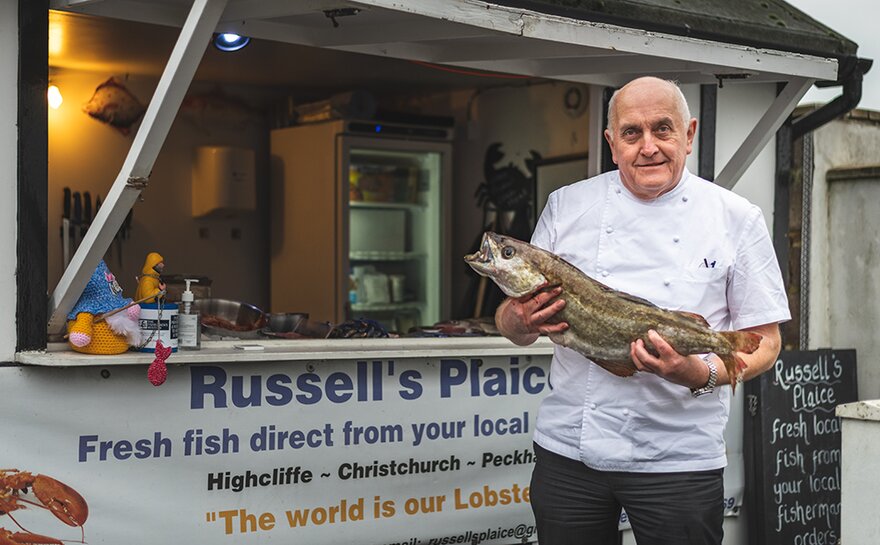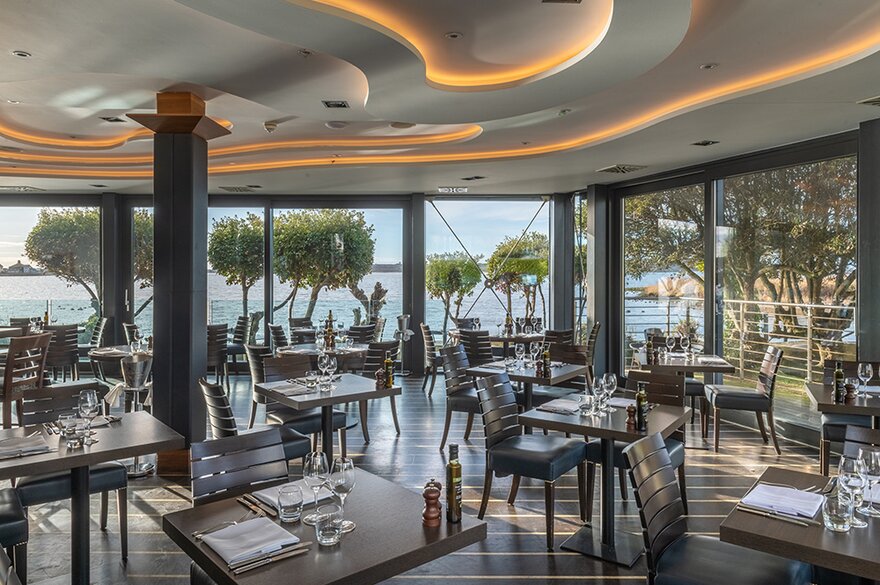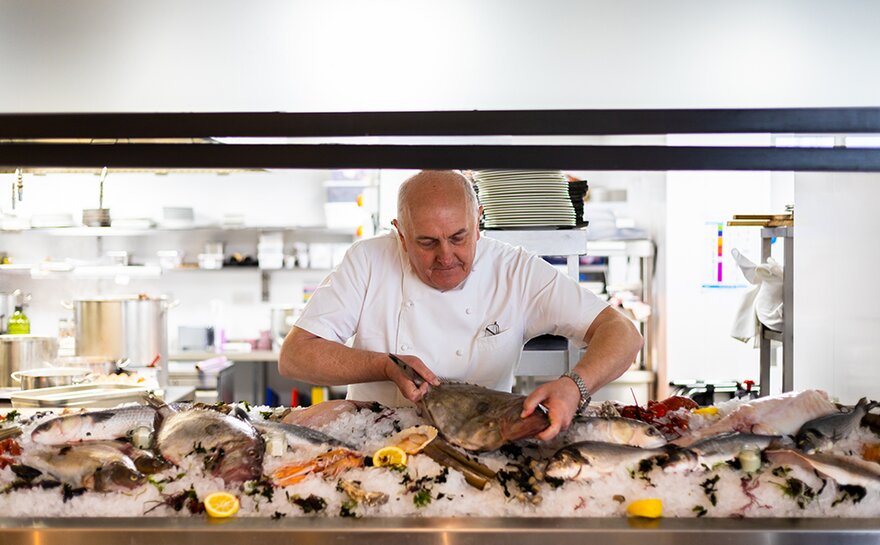The chef patron of the Jetty within the Harbour Hotels group is an expert when it comes to hotel restaurants since taking a side-step into hotel life nearly 25 years ago
Your career has spanned many areas of hospitality, from a critically acclaimed village restaurant to consulting for the Harbour Hotels group – tell us a little bit about your journey?
Around 40 years ago my wife and I bought a café in Brockenhurst in Hampshire and turned it into Le Poussin. I'd been a maître d', but I had never worked in a commercial kitchen before, so it was a leap of faith.
It was a very simple village restaurant, but it caught the attention of The Good Food Guide. We rode out the recession in the 1980s by selling the main restaurant and decamping to a smaller site around the back to hunker down. Because it was only 24 covers, it was full all of the time and there was a lack of stress about having fewer overheads. The restaurant received a star in 1995 and kept it for five years. I got a bit restless towards my 40th birthday and I was invited to put Le Poussin into a hotel, and I partnered with investor Jim Ratcliffe to buy the Park Hill hotel in Lyndhurst in 1999.
What was the biggest change going into hotels?
I went from cooking for 24 people to 84 people, as well as weddings, events and functions – it just became much bigger. While it was quite an anxious time, we made a tremendous success of it. After a year or so I project managed the redesign of the hotel and we transformed it into the Lime Wood, which opened in 2009.
While the hotel was being renovated we wanted to find a little hotel so we could keep running the restaurant and ensure it didn't lose its star. We bought Whitley Ridge in 2004, which was a country house hotel with 18 bedrooms and a coach house. We retained that star until we closed in 2009.
After we opened Lime Wood it was crunch time as the banks went bust, so we bought Robin Hutson in to help, which was brilliant. But I burnt myself out doing too much, cashed in my shares and resigned from my position in 2009.
I was looking to buy another property when I was approached by Harbour to take over the restaurant within its Christchurch hotel in 2010, to take on the site Gary Rhodes was running. My son AJ joined me, and I bought in a local following. The first year we more than broke even and last year that little restaurant turned over £2.75m.
What's the most important thing you need to consider when it comes to hotel restaurants?
It's about achieving the right atmosphere – the charm and the service. I've seen the transformation from hotels with dining rooms to hotels with restaurants. Restaurants today need to appeal to non-residential guests as well as residents. The typical dining rooms within hotels used to have a simpler and all-encompassing menu rather than menus that would excite and entice people in. At Harbour Hotels we designed the restaurant with that thought in mind: that guests might book in to dine and then choose to stay the night. When you have non-residents in to dine, you have a certain buzz – the atmosphere changes because people are choosing to eat there.
Tell us more about the aim of the Jetty brand
I'm the chef-patron of the three Jetty restaurants within the Harbour Hotels group at its Christchurch, Southampton and Salcombe hotels. The Jetty is all about seafood because all three hotels are surrounded by water. Before I went into hospitality I worked on a trawler, so I have had a knowledge of fish from a young age. The Jetty restaurants are sort of fine dining, but relaxed – I didn't want that stuffy, starchy atmosphere, I want people to enjoy their food and their time with us. We have a tasting menu and we offer wine flights, but we also have people coming in to enjoy just one course.
Describe some of your bestselling dishes
One of my favourite dishes is, bizarrely, not a fish dish. It's a starter of stuffed quail with wild mushrooms – I was foraging for those before most of the chefs of today were born! We also have a halibut with crab tortellini, which is flying out of the door.
Another favourite is the octopus carpaccio – everyone loves octopus nowadays – and we quite like a surf 'n' turf like chicken breast with grilled prawns and lobster sauce, which has found itself on a lot of Harbour Hotels menus. The biggest secret in food is about using ingredients people love and cooking them, but not over-working them.
I've been with Harbour Hotels for 13 years and several of the dishes on the first menu are still on the menu today. There are two in particular: the twice-baked cheese soufflé and the cod 'n' crab dish, which is virtually on every Harbour Hotel restaurant menu.
How do some of your dishes make their way onto restaurants owned by Harbour Hotels but outside the Jetty brand?
Some dishes slip onto other menus because they're great dishes that people love to eat – and they have a great margin. I work in a consultancy role for Harbour Hotels looking after the Jettys, but I also sit on the executive board. Often it's a case that one of the directors or senior shareholders has eaten a dish at my restaurant and want it on every menu, which is such a complement. For instance, the managing director, Mike Warren, who is ex-Hotel Du Vin, grew up going to my restaurant Le Poussin when he was at Chewton Glen, so we have a great respect for each other – we're friends as well as work colleagues. And I'm also good friends with John Pollard, the executive chef of Harbour Hotels, and he is open to dishes moving onto other menus around the group.
What is your management style?
When you're a consultant or an executive chef, if you're belligerent or shout about doing everything being this way or that, you'll only ever have transient chefs in your building. And one of my secrets at the Jettys is my staff retention. When I took over from Gary Rhodes, I had a young sous chef called Craig, who is now executive chef at Christchurch, and he's been with me throughout this journey. In Southampton 65% of my team have been here since we opened six years ago.
The great thing about being part of a group is when a chef hits a ceiling as a sous and is keen to be a head chef, you can offer them a role within the group in another outlet, so they continue to grow with the business. Some leave – that's the nature of the beast – but some go off, get experience elsewhere and come back and we find positions for them.
How has trading been this year?
We've had a good summer, but not as good as previous years. That said, September was amazing for the sunshine – people want to go out and eat and enjoy themselves when it's sunny. It's been a tough year, but not that bad. We're just about on budget and it was a tough budget. Last year everyone was cash-rich after the pandemic, while the hardest part of this year is keeping guests coming through the doors when there's a cost of living crisis.
How are you trying to mitigate this?
We've got to make sure we're offering really good value for money. For instance, we have a five-course mini tasting menu at £35 and that is cheap. So if you have 20 people coming in to eat that, that's the first 20 covers in and the restaurant has a buzz.
We've had Italian-, French- and Asian -themed menus before, and we have a Jetty favourites menu. Our menus remove the waste element, and I maintain that it's not what you charge, it's what you don't throw away. So many chefs waste food because of over-trimming or putting things on the plate that a customer doesn't eat anyway – so what's the point?
I believe chefs should spend one day a month next to the pot-wash to see what comes back from the table – if those micro herbs and pretty flowers are left, look at the cost of them.
What challenges are you facing as you head into 2024?
The £11 an hour minimum wage will be a big hit next year because it's not just employees on minimum wage – if your kitchen porter is unqualified and on that, your restaurant server and supervisors will also want more, so the consequential rise across the board is what is going to hit us all very hard.
That said, I think our industry is amazing and, especially post-Covid, the work-life balance for our employees is better and the team are being paid well – you can see chefs taking home £30,000 to £50,000 or a head chef on £60,000-plus.
It's no longer an industry for people who didn't concentrate at school, there's an art to it and a proper career path. I left school as soon as I could to work on the trawler, then fell into becoming a waiter and worked my way up. I absolutely adore it – I still love my job.
I still think there's one more restaurant in me somewhere – I haven't stopped yet –but I look back and I'm very proud of what I've created.
Aitkens' timeline
1977-1982 – first taste of hospitality at Le Chanteclerc in the New Forest, where Aitken worked his way up to maître d'
1983– opened Le Poussin in Brockenhurst
1988 – expanded into neighbouring property to open delicatessen Le Poussin Larder
1989 – Le Poussin reopens in a small courtyard as a 24-cover restaurant
1995 – Le Poussin gains a Michelin star
1999 – sells Le Poussin and goes into a joint venture with Sir Jim Ratcliffe, chief executive of chemicals giant INEOS, to buy Park Hill Hotel in Lyndhurst, where Aitken took Le Poussin into the kitchen and regained its Michelin star
2002– Park Hill hotel awarded AA red star status and planning permission is granted to redevelop the building
2004 – Park Hill closes to carry out the works and the team purchase 20-bedroom Whitley Ridge in Brockenhurst, providing a home for Le Poussin, which yet again regains its Michelin star and holds it until 2009
2009 – Park Hill hotel reopens as Lime Wood
2009 – Aitken sells shares in Lime Wood and exits the business
2010 – Whitley Ridge becomes the original Pig
2010 – Aitken joins Harbour Hotels as chef consultant at the Jetty
From the menu
Starters
- Alex's twice-baked creamy cheese soufflé
- Cured gurnard and aubergine tartare with baba ganoush
- Chicken and lobster terrine with Coronation salad
Mains
- Carbonara arancini, ham hock and
- New Forest wild mushrooms, confit egg yolk and anchovy dressing
- Plaice cutlet, hassleback potato, chicken and caviar sauce with courgette ribbons
- Jetty fish and chips with crushed peas and homemade tartare sauce
- Cod ‘n' crab: fillet of cod, topped with crab and herb crust, creamed mash, crushed peas and lemon butter sauce
- Chicken, prawn and lobster: brined roasted chicken breast, truffle leeks, plump prawn and creamed lobster bisque
Desserts
- Mixed berry crumble, crème anglaise, tonka bean ice-cream
- Chocolate ganache cake, strawberry ice-cream
- Cherry and chocolate trifle, cherry gel
- Kirsch jelly and vanilla ice-cream
- Passion fruit soufflé with passion fruit sauce and mango sorbet
Continue reading
You need to be a premium member to view this. Subscribe from just 99p per week.
Already subscribed? Log In








